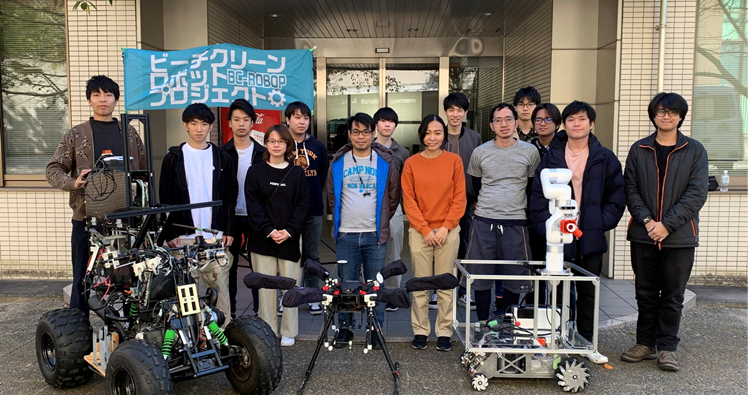
International EDUCATION PROGRAM

KyutechiART Program
Scholarship
Application Guide of MEXT scholarship for iART Program
@ Dept. of Creative Informatics,
Graduate School of Computer Science and Systems Engineering
This program aims to develop autonomous robots and AI technology to improve the productivity and efficiency of robots, solve problems faced by local entrepreneurs, and conduct research on Innovative Robotics/AI Technology (iART) in collaboration with Japanese and international students, as well as local companies.
Grade Point Average (GPA) Conversion Method
Applicants must have a minimum of 2.30 GPA, which is calculated by the following calculation method
| Grading Scale | Grade Points (GP) | ||||
|---|---|---|---|---|---|
| 4 point grade scale | – | Excellent | Good | Average | Fall |
| – | A | B | C | F | |
| – | 100-80 | 79-70 | 69-60 | 59 or less | |
| 5 point grade scale | S | A | B | C | F |
| A | B | C | D | F | |
| 100-90 | 89-80 | 79-70 | 69-60 | 59 ore less | |
| GPA Points | 3 | 3 | 2 | 1 | 0 |
([No.of GP3 Credits] × 3) + ([No.of GP2 Credits] × 2) + ([No.of GP1 Credits] × 1) + ([No.of GP0 Credits] × 0)
Total Number of Registered Credits
(Note 1) If the course you have taken does not have a credit system, please calculate by replacing the number of credits with the number of subjects.
Total number of registered credits
(Note 2) If you have transferred to a university, the number of credits after transfer will be counted.
(Note 3) Grades not listed in the above table (e.g., "certified," "passed," etc.) are not eligible.
(Note 4) If the academic performance coefficient contains a fraction, round down to the third decimal place.
(Note 5) For grading scales not included in the table above (for example, “8-point scale,” “10-point scale, etc), if the university that issued the student ‘s transcript or an official government authority in the relevant country provides an official conversion table (such as a 100 -point conversion table), the academic performance coefficient should be calculated using that conversion table. If no official conversion table exists, follow the procedure for cases in which the academic performance coefficient cannot be calculated (see below)
When the academic performance coefficient cannot be calculated
If the academic performance coefficient cannot be calculated according to the table, the student must submit a recommendation letter from their home institution that clearly indicates:
- The student’s rank (e.g., 5th out of 50 students)
- This rank places the student within the top 30% of their class, faculty, department, or graduate school
- The letter is issued by the dean or a higher-ranking official addressed to the president of Kyushu Institute of Technology
Example: “The student ranks 5th out of 50 students in the department of ○○ , placing them within the top 30%”
Application documents
These documents must be prepared in Japanese or English. If the documents are prepared in other languages, a Japanese translation must be attached. All documents should be prepared in A4 format using document creation software, etc., whenever possible. We prefer translations to be issued by the university or government agency and bear a stamp or embossed seal of the school or the agency and the signature of the authorizing official.
Required Documents to the Submission
How to apply
Send e-mail to
Professor HAYASHI Eiji (Professor)
Deputy-Director of the Center for Future Society Implementation for Robotics
Robotics Course, Department of Intelligence and Control Systems Faculty of Computer Science & System Engineering
Kyushu Institute of Technology
Contact and send the application to : iArt-support[@]pr.iizuka.kyutech.ac.jp

iART Program
https://www.iizuka.kyutech.ac.jp/iart
Hayashi Lab.
https://www.robotics.ics.kyutech.ac.jp/
Hayashi Lab (google site)
https://sites.google.com/view/hayashilab-kyutech
About Kyutech
https://www.kyutech.ac.jp/
Application Guidelines
Scholarship applicants must meet the requirements listed in the file below.
Application Guidelines (English)
Application Guidelines (Japanese)

